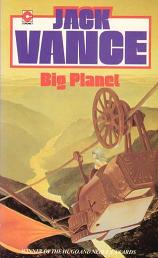
Big Planet
Jack Vance
158 pages
published in 1951
It's always dangerous to reread books you fondly remember from your youth. As Jo Walton put it, between the time you last read it and your rereading it, a book might have been visited by the suck fairy, which has taken all the awesome bits you remember and replaced them with dullness. Worse, the racism or sexism fairy may have also visited... I was therefore taken a risk in rereading Big Planet, one of the earliest Jack Vance novels I had ever read. Would it still be the great planetary romance I remember, or would all the adventure and wonder have been sucked out of it?
It turned out to be a bit of both. Not as good or great an adventure as my memory had made it, but still worth reading on its own accord. What my memory had made of Big Planet was much more exotic and detailed than it turned out to be, the real thing much more sketched out than filled in and how could it not with only 158 pages to play with. Nevertheless Big Planet is an important novel in Jack Vance's development as a writer, as well as influential on other writers, as it shaped the planetary romance subgenre. Planetary romance being any science fiction story which takes place on a single planet and where most of the book revolves around the exploration of the planet, the stage more important than the actors on it.
The titular Big Planet is a metal poor world with earth-like gravity, which has been settled by all sorts of dissidents from Earth society, which has become fairly regimented and hegemonised, though in a fairly enlightened way. Its size and the variety of misfits that have been left lose on it means hundreds if not thousands of different, mainly low tech societies have sprung up, something encouraged by Earth. When reports of arms smuggling and slave trading to Big Planet as well rumours about an ambitious ruler, Charley Lysidder, Bajarnum of Beaujolais starting to conquer neighbouring countries reach Earth, an expedition is sent to find the truth about this and end it. The expedition's space ship however crashes and ends up forty thousand miles from Earth Enclave and now the expedition has to travel on foot to it, with the Bajarnum's forces on their heels.
This promises a lot: adventures, excitement, new cultures every few hundred miles or so, but while things start off quickly -- the expedition has crashed, recovered and set off on its trek within the first twenty pages -- the truth is that obviously you can't tell this story in just 158 pages. So while the crew do set off on their grand tour, they don't get much further than a paltry few thousand miles or so, a mere fraction of the total distance before the plot is resolved rather abruptly and the Bajarnum is neutralised, but not before most of the expedition has been killed or has dropped out.
Granted, by that time we have met a few interesting societies and places, the best of which is Kirstendale, a thoroughly capitalist status based society, but one in which every man's a millionaire and takes turns working as the servant of everybody else. This is done with the typical Vancian flair for small telling details. For instance, travellers are judged on the hotel they chose, yet each of the choices is just a different entrance to the same building...
Had Big Planet been written twenty years later, when Vance was both a much better writer and would've had more room for his creation, this might've been a very good novel. Now, it's a bit disappointing: you see what could've been but are stuck with something that promises more than it delivers.